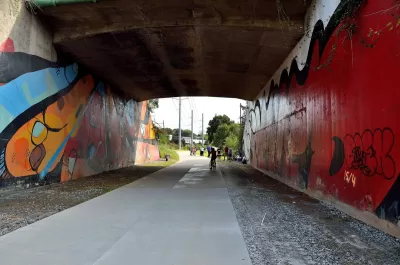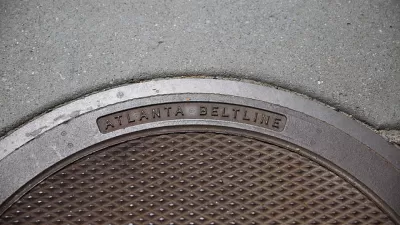Large-scale adaptive reuse projects like the BeltLine in Atlanta receive praise in many circles. But they can also release a flurry of speculation, severely threatening affordability.

As we saw in July, Atlanta's BeltLine has come under fire for paying scant attention to future housing affordability in its vicinity. Dan Immergluck continues on that vein in Shelterforce, writing that "absent a fundamentally new approach to redevelopment planning that places housing affordability at the center of the process, large-scale sustainable development projects are likely to become engines of what has been termed 'environmental gentrification.'"
The project derives part of its funding from tax increment financing (TIF). "As the BeltLine's principal funding mechanism, the TIF redirects increases in property tax revenues that arise after its establishment to project-related expenses rather than to the regular general revenue budgets of the city, county, or school district."
Immergluck writes that around the BeltLine, property values have already risen substantially, despite the fact that the project isn't set for completion until 2030. "Without addressing affordability well before groundbreaking, there will be far less ability to provide for inclusive development in which affordable housing remains viable in the long run."
FULL STORY: Sustainable for Whom? Large-Scale Sustainable Urban Development Projects and “Environmental Gentrification”

Trump Administration Could Effectively End Housing Voucher Program
Federal officials are eyeing major cuts to the Section 8 program that helps millions of low-income households pay rent.

Planetizen Federal Action Tracker
A weekly monitor of how Trump’s orders and actions are impacting planners and planning in America.

Ken Jennings Launches Transit Web Series
The Jeopardy champ wants you to ride public transit.

California Invests Additional $5M in Electric School Buses
The state wants to electrify all of its school bus fleets by 2035.

Austin Launches $2M Homelessness Prevention Fund
A new grant program from the city’s Homeless Strategy Office will fund rental assistance and supportive services.

Alabama School Forestry Initiative Brings Trees to Schoolyards
Trees can improve physical and mental health for students and commnity members.
Urban Design for Planners 1: Software Tools
This six-course series explores essential urban design concepts using open source software and equips planners with the tools they need to participate fully in the urban design process.
Planning for Universal Design
Learn the tools for implementing Universal Design in planning regulations.
Ada County Highway District
Clanton & Associates, Inc.
Jessamine County Fiscal Court
Institute for Housing and Urban Development Studies (IHS)
City of Grandview
Harvard GSD Executive Education
Toledo-Lucas County Plan Commissions
Salt Lake City
NYU Wagner Graduate School of Public Service





























